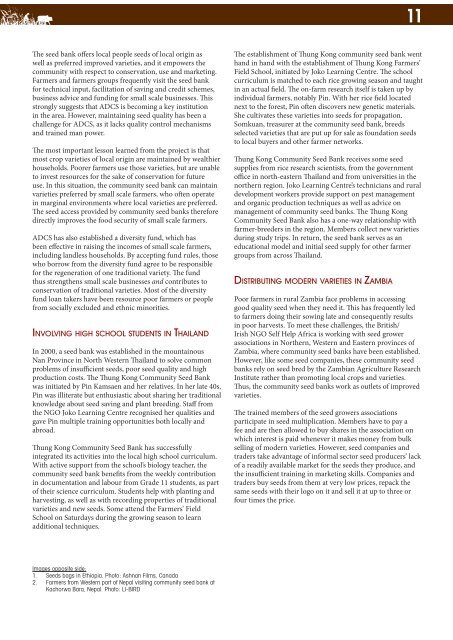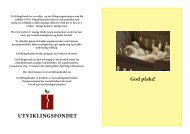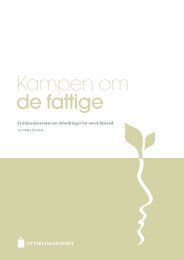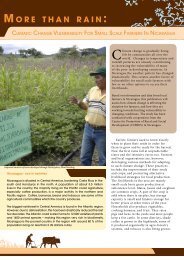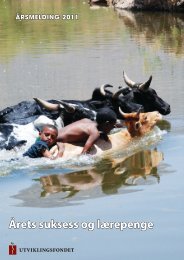Banking for the future: - Third World Network
Banking for the future: - Third World Network
Banking for the future: - Third World Network
- No tags were found...
Create successful ePaper yourself
Turn your PDF publications into a flip-book with our unique Google optimized e-Paper software.
11The seed bank offers local people seeds of local origin aswell as preferred improved varieties, and it empowers <strong>the</strong>community with respect to conservation, use and marketing.Farmers and farmers groups frequently visit <strong>the</strong> seed bank<strong>for</strong> technical input, facilitation of saving and credit schemes,business advice and funding <strong>for</strong> small scale businesses. Thisstrongly suggests that ADCS is becoming a key institutionin <strong>the</strong> area. However, maintaining seed quality has been achallenge <strong>for</strong> ADCS, as it lacks quality control mechanismsand trained man power.The most important lesson learned from <strong>the</strong> project is thatmost crop varieties of local origin are maintained by wealthierhouseholds. Poorer farmers use those varieties, but are unableto invest resources <strong>for</strong> <strong>the</strong> sake of conservation <strong>for</strong> <strong>future</strong>use. In this situation, <strong>the</strong> community seed bank can maintainvarieties preferred by small scale farmers, who often operatein marginal environments where local varieties are preferred.The seed access provided by community seed banks <strong>the</strong>re<strong>for</strong>edirectly improves <strong>the</strong> food security of small scale farmers.ADCS has also established a diversity fund, which hasbeen effective in raising <strong>the</strong> incomes of small scale farmers,including landless households. By accepting fund rules, thosewho borrow from <strong>the</strong> diversity fund agree to be responsible<strong>for</strong> <strong>the</strong> regeneration of one traditional variety. The fundthus streng<strong>the</strong>ns small scale businesses and contributes toconservation of traditional varieties. Most of <strong>the</strong> diversityfund loan takers have been resource poor farmers or peoplefrom socially excluded and ethnic minorities.Involving high school students in ThailandIn 2000, a seed bank was established in <strong>the</strong> mountainousNan Province in North Western Thailand to solve commonproblems of insufficient seeds, poor seed quality and highproduction costs. The Thung Kong Community Seed Bankwas initiated by Pin Kamsaen and her relatives. In her late 40s,Pin was illiterate but enthusiastic about sharing her traditionalknowledge about seed saving and plant breeding. Staff from<strong>the</strong> NGO Joko Learning Centre recognised her qualities andgave Pin multiple training opportunities both locally andabroad.Thung Kong Community Seed Bank has successfullyintegrated its activities into <strong>the</strong> local high school curriculum.With active support from <strong>the</strong> school’s biology teacher, <strong>the</strong>community seed bank benefits from <strong>the</strong> weekly contributionin documentation and labour from Grade 11 students, as partof <strong>the</strong>ir science curriculum. Students help with planting andharvesting, as well as with recording properties of traditionalvarieties and new seeds. Some attend <strong>the</strong> Farmers’ FieldSchool on Saturdays during <strong>the</strong> growing season to learnadditional techniques.The establishment of Thung Kong community seed bank wenthand in hand with <strong>the</strong> establishment of Thung Kong Farmers’Field School, initiated by Joko Learning Centre. The schoolcurriculum is matched to each rice growing season and taughtin an actual field. The on-farm research itself is taken up byindividual farmers, notably Pin. With her rice field locatednext to <strong>the</strong> <strong>for</strong>est, Pin often discovers new genetic materials.She cultivates <strong>the</strong>se varieties into seeds <strong>for</strong> propagation.Somkuan, treasurer at <strong>the</strong> community seed bank, breedsselected varieties that are put up <strong>for</strong> sale as foundation seedsto local buyers and o<strong>the</strong>r farmer networks.Thung Kong Community Seed Bank receives some seedsupplies from rice research scientists, from <strong>the</strong> governmentoffice in north-eastern Thailand and from universities in <strong>the</strong>nor<strong>the</strong>rn region. Joko Learning Centre’s technicians and ruraldevelopment workers provide support on pest managementand organic production techniques as well as advice onmanagement of community seed banks. The Thung KongCommunity Seed Bank also has a one-way relationship withfarmer-breeders in <strong>the</strong> region. Members collect new varietiesduring study trips. In return, <strong>the</strong> seed bank serves as aneducational model and initial seed supply <strong>for</strong> o<strong>the</strong>r farmergroups from across Thailand.Distributing modern varieties in ZambiaPoor farmers in rural Zambia face problems in accessinggood quality seed when <strong>the</strong>y need it. This has frequently ledto farmers doing <strong>the</strong>ir sowing late and consequently resultsin poor harvests. To meet <strong>the</strong>se challenges, <strong>the</strong> British/Irish NGO Self Help Africa is working with seed growerassociations in Nor<strong>the</strong>rn, Western and Eastern provinces ofZambia, where community seed banks have been established.However, like some seed companies, <strong>the</strong>se community seedbanks rely on seed bred by <strong>the</strong> Zambian Agriculture ResearchInstitute ra<strong>the</strong>r than promoting local crops and varieties.Thus, <strong>the</strong> community seed banks work as outlets of improvedvarieties.The trained members of <strong>the</strong> seed growers associationsparticipate in seed multiplication. Members have to pay afee and are <strong>the</strong>n allowed to buy shares in <strong>the</strong> association onwhich interest is paid whenever it makes money from bulkselling of modern varieties. However, seed companies andtraders take advantage of in<strong>for</strong>mal sector seed producers’ lackof a readily available market <strong>for</strong> <strong>the</strong> seeds <strong>the</strong>y produce, and<strong>the</strong> insufficient training in marketing skills. Companies andtraders buy seeds from <strong>the</strong>m at very low prices, repack <strong>the</strong>same seeds with <strong>the</strong>ir logo on it and sell it at up to three orfour times <strong>the</strong> price.Images opposite side:1. Seeds bags in Ethiopia. Photo: Ashnan Films, Canada2. Farmers from Western part of Nepal visiting community seed bank atKachorwa Bara, Nepal. Photo: LI-BIRD


